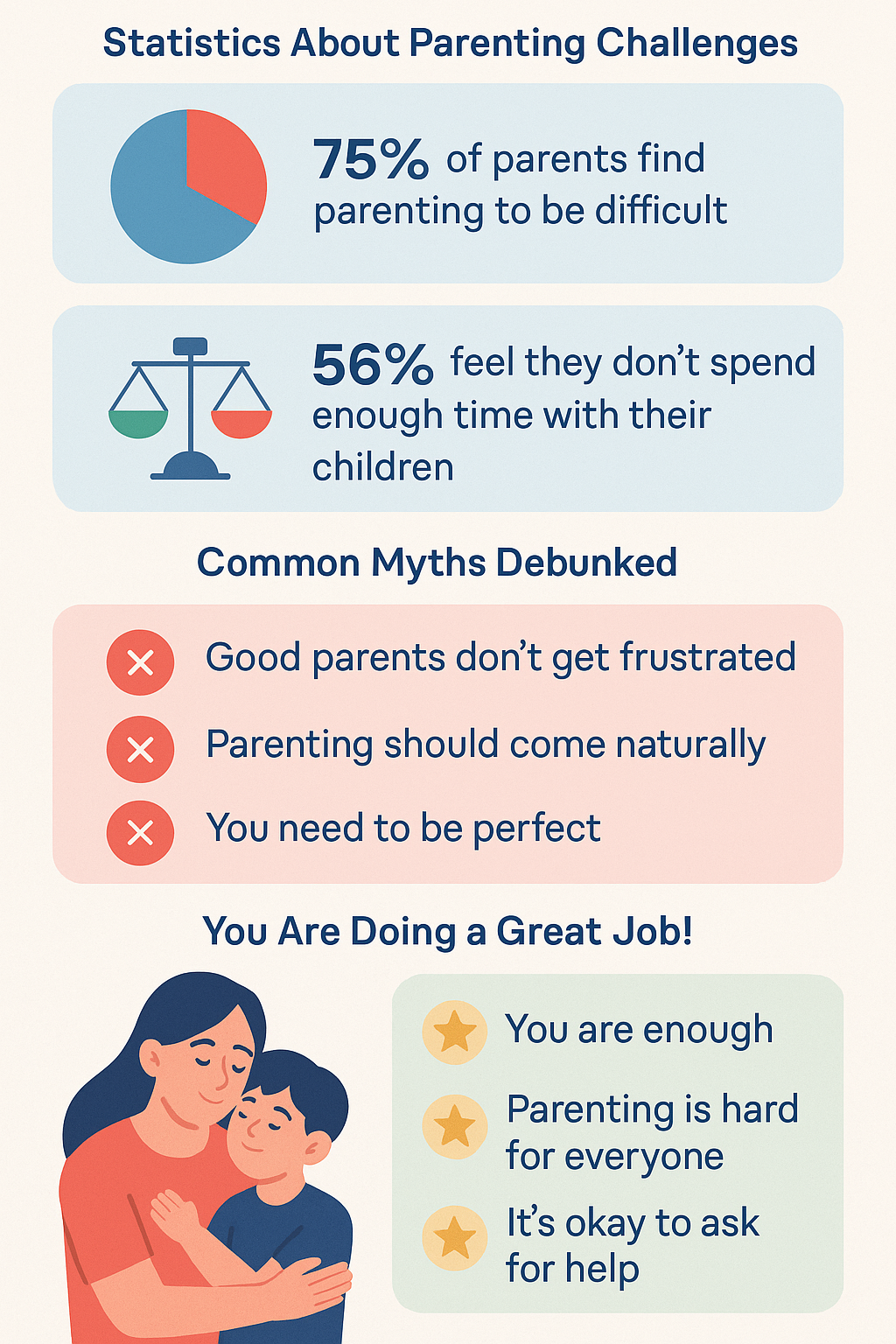Understanding the Bluey Parenting Pressure Phenomenon
Recent research reveals a troubling trend: dads especially are experiencing depression and inadequacy after watching Bandit, Bluey’s endlessly patient and creative father. These feelings stem from comparing real-life parenting struggles to what appears to be effortless, joyful engagement with children on screen. This has become known as Bluey Parenting Pressure.
The comparison trap feels familiar to many parents. You watch Bandit transform ordinary moments into elaborate adventures, never losing his cool or running out of creative ideas. Meanwhile, you’re struggling to get through bedtime without a meltdown – yours or your child’s.
The Seven-Minute Reality Check
Here’s what every parent needs to remember: each Bluey episode lasts exactly seven minutes. That’s it. Seven carefully crafted, edited minutes that showcase the absolute best moments of family interaction.
Consider this perspective shift. If you filmed every moment of Bandit’s day, you’d likely find hours of mundane activities, frustrated sighs, and less-than-perfect parenting moments. The show simply captures the highlight reel, not the full reality of daily family life.
Research shows that parents are actually only attuned to their children’s needs about 20-30% of the time – and that’s completely normal and healthy. The other 70-80% includes missed cues, distractions, and yes, even some parenting fails. This is exactly how children learn resilience and independence.
Even Bandit Isn’t Perfect
Many viewers overlook the episodes where Bandit clearly struggles with parenting challenges. In “Stumpfest,” he becomes visibly frustrated when the kids won’t stop playing. In “Hospital,” he reluctantly participates in pretend play, clearly not in the mood. “Takeaway” shows him sitting on his phone, getting annoyed by endless questions.
These moments reveal an important truth: even the “perfect” animated dad has rough patches, bad days, and times when parenting feels overwhelming.
The Hidden Cost of Perfection Pressure
Studies indicate that 57% of parents report experiencing burnout, largely influenced by unrealistic expectations and social pressures. This parenting perfectionism creates a cascade of negative effects for both parents and children.
When parents constantly strive for Bluey-level engagement, several problems emerge. First, parental burnout increases significantly, leading to higher rates of depression and anxiety in both parents and their children. Second, children miss out on learning how to handle disappointment, boredom, and the reality that adults can’t always be endlessly entertaining.
Embracing Good Enough Parenting
The concept of “good enough” parenting, developed by pediatrician Donald Winnicott in the 1950s, offers a healthier alternative to perfectionist standards. Good enough parents provide consistent care and emotional availability without needing to be constantly engaging or perfect.
This approach recognizes that children benefit from experiencing manageable frustration and learning that their needs won’t always be met immediately. These experiences build emotional resilience and prepare children for real-world interactions where perfect attunement is impossible.
Good enough parenting includes:
-
Comforting your child without shielding them from every discomfort
-
Listening with empathy even when you don’t have perfect responses
-
Making mistakes, apologizing, and modeling repair
-
Setting boundaries while remaining loving and supportive
Your Daily Seven-Minute Wins
Instead of focusing on what you’re not doing, celebrate your daily seven-minute victories. Maybe it’s the bedtime story where your child snuggled close, the silly dance in the kitchen while making dinner, or the moment you helped them work through a difficult emotion.
These authentic moments of connection matter far more than elaborate games or constant entertainment. Your child doesn’t need a Bandit-level performance every day. They need you – present, caring, and human.
Tomorrow Is Always a New Day
Perhaps the most important lesson is extending yourself the same grace you’d offer a good friend. Parenting brings daily challenges that can’t be solved with seven minutes of creative play. Some days you’ll nail it, others you’ll barely survive, and most days will fall somewhere in between.
This variation is not only normal but beneficial for your children’s development. They’re learning that relationships include ups and downs, that adults have emotions and limitations, and that love doesn’t require perfection.
A Tool for Parenting Self-Compassion
The Good Enough Parent: How to Raise Contented, Interested and Resilient Children by The School of Life offers practical wisdom for parents struggling with perfectionism. With excellent reviews from parenting experts, this 192-page guide provides compassionate instruction on raising resilient children without the pressure of being perfect. The book emphasizes that perfection isn’t required and could actually be unhelpful, as parents need to gently introduce children to life’s imperfections. Available on Amazon with strong ratings, it serves as a valuable reminder that good enough parenting prepares children for an imperfect world.
Moving Forward with Confidence
Remember that Bluey’s creators never intended to make real parents feel inadequate. The show celebrates family connection and play, not perfection. Use it as inspiration for occasional magical moments, but don’t let it become a measuring stick for daily parenting success.
Your seven-minute moments happen naturally when you’re present and authentic with your children. They don’t require elaborate setups or endless patience. Sometimes the best parenting happens during ordinary conversations, quick hugs between tasks, or simply being available when your child needs you.
Focus on progress, not perfection. Celebrate small wins. And remember that tomorrow always brings fresh opportunities to connect with your children in meaningful ways.
Share your parenting wins using #HolisticHabitHub and comment about your favorite everyday moments with your kids. What simple interactions bring you the most joy with your children?
Now that you are not comparing yourself the Chilli and Bandit read about The Benefits of Co-Watching with Your Toddler.

